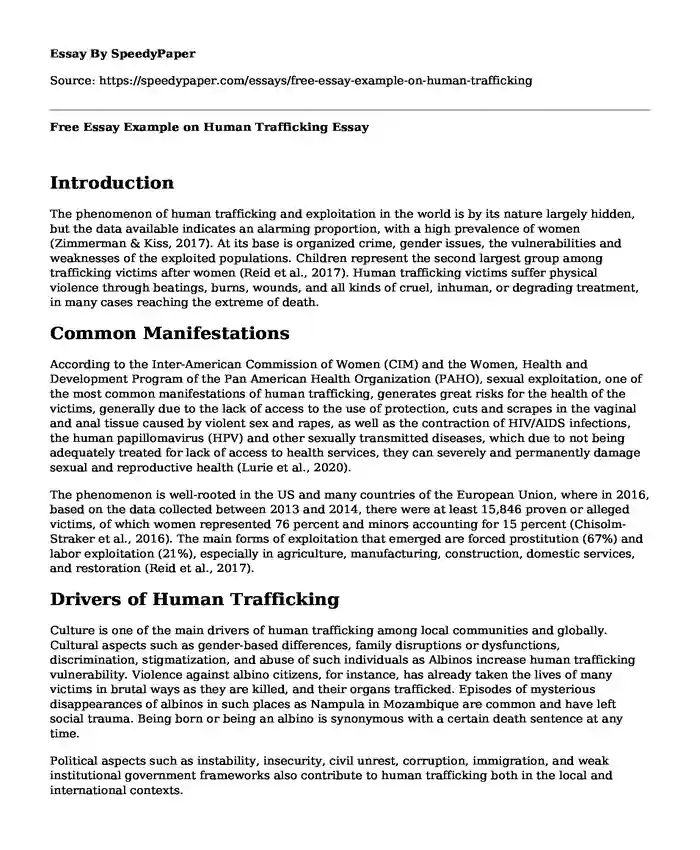
| Type of paper: | Essay |
| Categories: | Politics Culture Economics World Sexual abuse Human trafficking |
| Pages: | 3 |
| Wordcount: | 695 words |
Introduction
The phenomenon of human trafficking and exploitation in the world is by its nature largely hidden, but the data available indicates an alarming proportion, with a high prevalence of women (Zimmerman & Kiss, 2017). At its base is organized crime, gender issues, the vulnerabilities and weaknesses of the exploited populations. Children represent the second largest group among trafficking victims after women (Reid et al., 2017). Human trafficking victims suffer physical violence through beatings, burns, wounds, and all kinds of cruel, inhuman, or degrading treatment, in many cases reaching the extreme of death.
Common Manifestations
According to the Inter-American Commission of Women (CIM) and the Women, Health and Development Program of the Pan American Health Organization (PAHO), sexual exploitation, one of the most common manifestations of human trafficking, generates great risks for the health of the victims, generally due to the lack of access to the use of protection, cuts and scrapes in the vaginal and anal tissue caused by violent sex and rapes, as well as the contraction of HIV/AIDS infections, the human papillomavirus (HPV) and other sexually transmitted diseases, which due to not being adequately treated for lack of access to health services, they can severely and permanently damage sexual and reproductive health (Lurie et al., 2020).
The phenomenon is well-rooted in the US and many countries of the European Union, where in 2016, based on the data collected between 2013 and 2014, there were at least 15,846 proven or alleged victims, of which women represented 76 percent and minors accounting for 15 percent (Chisolm-Straker et al., 2016). The main forms of exploitation that emerged are forced prostitution (67%) and labor exploitation (21%), especially in agriculture, manufacturing, construction, domestic services, and restoration (Reid et al., 2017).
Drivers of Human Trafficking
Culture is one of the main drivers of human trafficking among local communities and globally. Cultural aspects such as gender-based differences, family disruptions or dysfunctions, discrimination, stigmatization, and abuse of such individuals as Albinos increase human trafficking vulnerability. Violence against albino citizens, for instance, has already taken the lives of many victims in brutal ways as they are killed, and their organs trafficked. Episodes of mysterious disappearances of albinos in such places as Nampula in Mozambique are common and have left social trauma. Being born or being an albino is synonymous with a certain death sentence at any time.
Political aspects such as instability, insecurity, civil unrest, corruption, immigration, and weak institutional government frameworks also contribute to human trafficking both in the local and international contexts.
Most of the enslaved people are from countries suffering from poverty and hunger, either recruited in their countries of origin or captured by the mafias that traffic impoverished migrants. In Mexico, a border country with the impoverished south, women and girls are trafficked, who are prostituted in places of tourism in the United States, UAE, and other countries of the European Union (Reid et al., 2017). In the north of Mozambique, trafficking in people and human organs flourishes, having found fertile ground the three provinces- Nampula, Niassa, and Cabo Delgado (Iroanya et al., 2018). The poverty that graces the majority of the population, the tremendous pressure of migrants, and the weak capacity to border surveillance constitute some of the economic drivers of human trafficking.
Conclusion
To solve human trafficking more effectively, there is a need to have a clearer understanding of its root causes. Economic situations such as poverty, unemployment, exclusion, including cultural and political factors such as demand for sexual services; cultural aspects such as gender and race inequality and generational inequities, patriarchal and homophobic culture; restrictive migration policies that create barriers to regular migration; models of economic development as factors of expulsion and attraction of people and services; the corruption and collusion of public officials; and deficiencies in state responses to tackle this crime, among others reinforce the occurrence of trafficking and related violence. Human trafficking is thus not only a global health problem, but also a systemic problem with cultural, political, and economic dimensions. The complexity of this crime makes it difficult to obtain effective results in terms of intervention, whether in legal proceedings or the protection and assistance of victims by healthcare professionals.
Cite this page
Free Essay Example on Human Trafficking . (2023, Nov 24). Retrieved from https://speedypaper.com/essays/free-essay-example-on-human-trafficking
Request Removal
If you are the original author of this essay and no longer wish to have it published on the SpeedyPaper website, please click below to request its removal:
- Free Essay: Sociological Perspective on Child Abuse
- An Unexpected Christmas Gift - Creative Writing Essay Example
- Essay Sample Dedicated to the Human Resource Policies of the ICRC
- Free Essay: A Concept of Interest on Classical Realist Theories of International Relations
- Black Americans Do Not Trust the Medical Sector. Free Essay
- Essay Sample on Gender Equality: A Necessity for a Better Society
- Addiction: Human Habits & Its Trauma Impacts - Essay Sample
Popular categories




